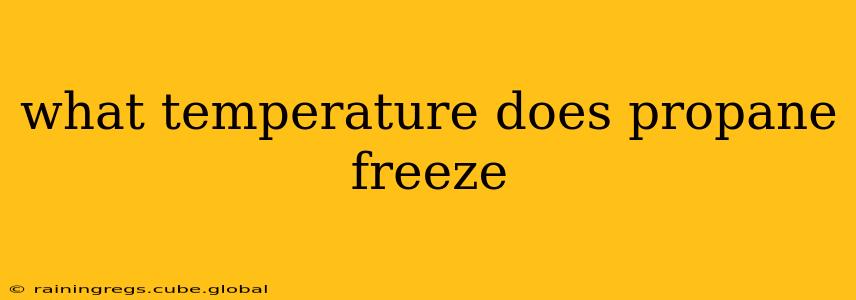Propane, a widely used fuel source for heating, cooking, and vehicles, remains a reliable energy choice even in freezing temperatures. However, understanding its behavior at low temperatures is crucial for safe and efficient use. This article delves into the freezing point of propane, exploring its properties and implications for various applications.
What is the Freezing Point of Propane?
The freezing point of propane is -187.7°C (-305.86°F). This extremely low temperature means that propane itself doesn't freeze under typical winter conditions experienced in most parts of the world. This is a key advantage of propane over other fuels that solidify at much higher temperatures. The concern isn't the propane freezing, but rather the effect of extremely low temperatures on its vapor pressure and the equipment used to store and handle it.
Does Propane Become Less Effective in Cold Weather?
While propane doesn't freeze, its vapor pressure decreases in cold weather. This means less propane vaporizes, leading to a potentially slower burn rate or reduced efficiency in appliances. This is more noticeable in extremely cold conditions, but generally, propane appliances are designed to function effectively even in sub-zero temperatures.
How Does Cold Weather Affect Propane Tanks?
Cold weather can affect the pressure within propane tanks. The lower pressure can impact the rate at which propane is delivered to appliances. While the propane itself doesn't freeze, extreme cold can cause the regulator or other components of the system to malfunction. Regular maintenance and inspection of propane equipment are crucial, especially in colder climates.
Can Propane Tanks Freeze?
No, the propane inside the tank will not freeze. However, moisture in or around the tank could freeze, potentially blocking the valve or causing other problems. Proper storage of propane tanks, away from moisture and in a well-ventilated area, is essential.
What Happens if My Propane Tank is Exposed to Extremely Low Temperatures?
Exposure to extremely low temperatures might reduce the vapor pressure, leading to a decrease in the efficiency of appliances. It's crucial to ensure your propane system is properly maintained and inspected regularly, particularly in areas experiencing prolonged periods of extreme cold. Consult a qualified propane professional if you have concerns about your system's performance in cold weather.
How Can I Ensure My Propane System Performs Optimally in Cold Weather?
To ensure optimal performance in cold weather, consider these steps:
- Regular Maintenance: Schedule regular inspections and maintenance of your propane appliances and tanks by a qualified technician.
- Proper Tank Placement: Store your propane tanks in a well-ventilated area, protected from moisture and extreme temperature fluctuations.
- Choose the Right Equipment: Select appliances and equipment specifically designed for reliable performance in cold climates.
Understanding the properties of propane and its behavior in cold weather is essential for safe and efficient use. While the propane itself won't freeze in typical winter conditions, the lower vapor pressure and potential for equipment malfunctions in extreme cold require vigilance and proper maintenance. By following the tips above, you can ensure your propane system functions reliably throughout the year.
